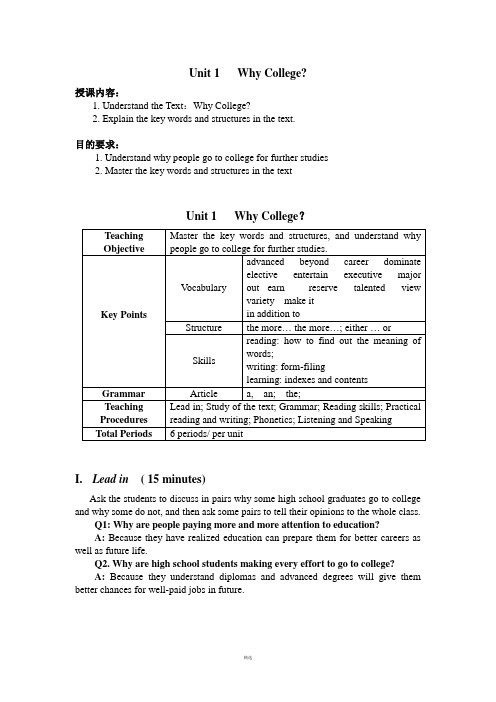高职高专英语第一册教案:Unit 1 Why English Is So Widely Spread
高一英语开学第一课——Why should we learn English 教学PPT课件

The Globalization of English
World Language
crocodile tears 鳄鱼的眼泪
olive branch 橄榄枝
Coca-Cola 可口可乐
sauna 桑拿浴
English and Chinese
B 股、AA 制、B 超、VISA 卡、BP 机
.
Why English?
CONTANTS
01
02
03
What is English?
。
英国英语(British English或UK English)又称英式英语,简称:英音。是在大不列颠及北爱尔兰联合王国(英国)使用的一种英语形式。
美ቤተ መጻሕፍቲ ባይዱ英语(American English或USA English)又称美式英语,简称美音。是在美国使用的一种英语形式。
China English
Confucianism 儒教
Kowtow 磕头
Wonton 馄饨
Taoism 道教
Ying 阴
Yang 阳
CONTANTS
01
02
03
How to learn English well?
要想练好听力,首先,要选择适当的语音材料:①所选语音材料必须地道、原汁原味;②所选语音材料应尽可能包罗万象,涵盖不同领域、不同话题,既要有正式用语,又要有日常会话;③材料应从简单的入手,逐渐增加难度。其次,听得方法:①利用零碎时间,这种听法要求你连贯地、不重复地听取大量语音材料,不需要听懂每一句话,只需听个大概就行。②抽出一段专门的时间,集中精力全神贯注地去听。这种听法不要求你听太多的内容,但务必要听懂每一句话,把握每一个细节。
《新思维高职高专英语综合教程(第一册)》电子教案1 Unit 7

Dialogue
(On the street, Elizabeth ran across Joanna, her roommates in university. They went into a café.)
resume [rezju:'mei] n. a short summary or account of sth.简历;履历
leave for set out for a place出发前往 farewell [feə'wel] n. the act of saying goodbye to
somebody 告别;辞行
Unit Seven A Parting Gift
Contents
Section One Sounds of English Section Two Language Building
Dialogue One Dialogue Two Section Three Intensive Reading Section Four Know-how Sharing Section Five Information Exchanging
treat [tri:t] v. to pay for something that somebody/you will enjoy and that you do not usually have or do 招待;款待;请(客);买 (可享受的东西)
Find the Information I. Listen to the dialogue and find the information as quickly as possible.
高教版职高英语1基础模块Unit1课件

Activity 12
Talk and complete. 用下面语句询问5个以上同学的个人信息,填写表格。
What’s your name?
What’s your first name / last name? Where are you from?
My name’s … / I’m … My first name / last name is … I’m from …
第8页,共64页。
2.任何时候都可以用,但比较见外
• How are you?你好吗?
3.适用于第一次见面
Nice to meet you. 很高兴见到你。 How do you do. 你好!(比较正式,现在已较少使
用) 适用于曾经见过一面,但不太熟的人
Nice to see you again. 很高兴再次见到你。
• Jane: Sure!
• 2. Jane: Good morning, Xiaobin. How are you today?
• Zhang Xiaobin: Pretty good, thanks. How about you?
第19页,共64页。
• 3. Jane: How are you doing?
66435160
Wang Li
25
a. telephone number
b. name
c. age
No. 3 Hexi Street, Tianjin
d. address
e. e-mail address
Manager f. job
第37页,共64页。
Activity 14
Read and check. 读以下名片,核对活动13的答案。
高教中职版《英语1(基础模块)》PPT多媒体课件unit01

B: No, I’m a manager.
Language in use
1 Grammar focus 2 Vocabulary practice
Grammar focus
I am = I’m you are = you’re
he is = he’s she is = she’s
Sara:
I’m from the US.
Activity 10
Listen and repeat. 跟读对话,学说选出的语句。
SLai rXai:aonianG: Looi dXimaornniainng.! I’m Sara Smith.
LSiaXraia:onian: GIosoydomurolransintgn, aMmises XSaiarao!nian?
Activity 9
Li Xiaonian: Li Xiaonian.
Sara:
Is your last name Xiaonian?
Li Xiaonian: No, my last name is Li.
Sara:
I see. Where are you from?
Li Xiaonian: I’m from Tianjin. Where are you from?
My name’s … / I’m … My first name / last name is … I’m from …
First Name
Last Name
From
Everyday English
Reading and writing
1
Activity 13
大学英语精读第1册unit1教案

College English One-- Intensive Reading 1College English(I) Teaching GroupDepartment of Foreign Language Teaching and Research Yangtze Normal UniversityUnit 1 Some Strategies for Learning EnglishIntensive readingObjectives:1. Understanding the main idea2. Understand the structure3. Learn related terms4. Master the key language points and grammatical structures in the text.5.Conduct a series of speaking and listening task based on the textTeaching focus:1.Learn to understand the strategies for English Leaning2. The understanding reading skillsPre-reading Tasks1.Warming up activitiesPair work/ group work: students work in pairs or groups to discuss their opinions about the following topics.1. When did your story of learning English start off?2. Do you enjoy learning English? Why?I enjoy learning English, because I find it very interesting. First, in my opinion, English isa beautiful language, including its pronunciation and shape. I enjoy speaking and listening to it.3. Do you have any trouble learning English?4. Do you think it useful to learn English with the help of some strategies?5. What strategies do you think can be employed in English learning?6. What do you think is the most effective way of learning English?As far as I am concerned, seeing English movies is the most effective way of learningEnglish. I choose those movies that I have great interest in, such as cartoons. For each movie, Iwill see at least three times—without subtitles, with Chinese ones and with English ones. And atthe same time speak loudly after the characters. Though enjoying movies, I make considerableprogress in English.2. Information related to the text.English as an International LanguageWorldwide over 1.4billion people live in countries where English has official status. Oneout of five of the world’s population speaks some English. Over 70% of the world’sscientists read English. About 85% of the world’s mails written in English, and 90% of allinformation in the world’s electronic retrieval systems is stored in English.Language learning strategiesLanguage learning strategies are used by learners to complete speaking, reading, vocabulary,listening and writing activities presented in language lessons. Recognizing that there is a task tocomplete or a problem to solve, language learners will use whatever strategies they possess toattend the language-learning activity.Possible language learning strategies include: using practice opportunities, self-evaluation, selective attention, time management, reviewing notes taken in class and checking one’s understanding, constantly seeking answers to questions instead of passively receiving information, etc.Active vocabulary and passive vocabularyActive vocabulary consist of the words you use frequently and comfortably in speaking and writing, while passive vocabulary consists of the words you recognize when you read and listen. Input-output balance theory in language learningInput in language learning refers to information read, seen or heard by the learner, while output refers to what the learner produces in writing and speaking. The input-output balance theory in language learning believes that one can learn a language well through maintaining abalance between input and output.English is not Real English.Skimming and scanningGlobal Reading1. Parts division of the textPart Ⅰ(Paras. 1-2) Introduce globally that while learning English is not easy, there are stillsome helpful strategies.Part Ⅱ(Paras. 3-8) Introduce six helpful strategies in detail.Part Ⅲ(Para. 9) Conclude that language learning is a process of accumulation.2. SummaryLearning English is not easy, but there are still some useful strategies that we can use to make it easier. The text introduces six strategies concerning vocabulary, idioms, listening, speaking, reading and writing, and these strategies cover the basic and important points in English learning. The text also tells us that language learning is a process of accumulation. It is worthwhile for us to take in as much as we can from reading and listening and then put them into practice through speaking and writing.3. Decide whether the following statements about the text are true or false.1) Language learners should memorize all the new words. (F)While active words demand constant practice and memorization, words that do not often occur in everyday situations require just a nodding acquaintance.2) It’s impossible to cram too many words into your head at a time.(T)3) he meaning of a word and the way native speakers use it are equally important.(T)4) Listening to English occasionally will improve your ear and speaking skills. (T)5) It’s important to catch every detail in English listening comprehension. (F)The first time one may not catch a great deal, but with each repetition one will get something more.6) Language learners do not find many opportunities to practice oral English at school.(T)4. Discourse AnalysisA strategy refers to a set of carefully planned methods for achieving something that is difficult and may take a long time.In introducing some strategies, the author adopts the structure of Problem—Strategy within a paragraph to show us the problems in English learning and then proposes strategies to solve5. What strategies do you think can be employed in English learning?Suggested Strategies:Make your own oppotunities for practice in using the language inside and outside the classroom.Specific ways:1)ask your teacher questions before, during and after class.2)speak to a foreigner3)listen to an English radio program.4)watch an English movie.5)read an English article on the Internet.6)use English software.While-reading TasksText Learning1.Explain the skill of skimming and scanning2.Ask student to skim the text to have a general idea about the text.3.Underline the difficult words and sentences and answer the questions on page 74.Expalin the text5.Ask students to sum up the good habit mentioned in the text and learn them by heart in the class.nguage points and structureNew words and expressions1. strategy: n. the act of planning and managing operations over a long period.Example: It’s a long way for our government to develop a strategy for dealing with unemployment.★tactic: n. 战术tactical: adj. 战术的strategy: n. 战略strategic: adj. 战略的Our strategy is “to pit one against ten”, while our tactic is “to pit ten against one”. 我们的战略是“以一当十”,我们的战术是“以十当一”。
大学英语第一册unit1教案

大学英语第一册unit1教案Unit 1 Some Strategies for Learning EnglishTeaching Objectives1. To require students obtain the information related to the text.2. To help students learn the new words and expressions.3. To get the students to communicate in English confidently.4. To teach the reading skill--- finding out word meanings through many different ways. Focuses and difficulties1.New words and phrases2.Reading skill--- finding out word meaningTeaching methodology1. Communicative method2. Cognitive method3. The Grammar-translation method4. The audio-lingual MethodTime allocation1.Preparation, new words and expressions ( 2 periods)2.Analyses of Passage A ( 2 periods)3.Exercises after Passage A ( 2 periods )4.Listening and speaking (2 periods )Teaching ProceduresI. Before ReadingBackground InformationActive Vocabulary and Passive Vocabulary Even native speakers of a language have both an active and a passive vocabulary. Active vocabulary consists of the words you use frequently and comfortably in speaking and writing, while passive vocabulary consists of the words you recognize when youread and listen. Therefore, when you encounter a new word or expression that you want to learn, you have to decide whether you want to be able to recognize it again or to make it part of your “active” vocabulary.II.Global Reading1.Discussion1) Do you think it useful to learn English with the help of some strategies?2) What strategies do you think can be employed in English learning?2. Q & A1) What is your definition of “language learning strategy”?2) Can we treat all new words in the same way? If no, how to divide new words into differentcategories, which deserve different treatment?3) What does the author want to tell us in Paragraph 4?Do you know the different meanings of the following two sentences?A) Besides Tom, everybody here has been to Beijing.B) Except Tom, everybody here has been to Beijing.4) What should you do if you cannot understand very well the English conversation or passage in a tape?5) If there is no partner, how could you practice speaking English?6) Do you agree with the author that in our learning environment reading is the main and most reliable source of language input? Why?7) What should be taken into consideration when you choose reading materials?8) According to the text, could you make a list of all that youcan write regularly?9) Do you have a pen pal? If yes, what do you often write to him or her?10) What is the relationship between reading, listening, speaking and writing?3. Discourse AnalysisA strategy refers to a set of carefully planned methods for achieving something that is difficult and may take a long time. In introducing some strategies, the author adopts the structure of Problem—Strategy within a paragraph to show us the problems in English learning and then proposes strategies to solve the problems. Please scan the text for some examples of the Problem—Strategy structure.III.Detailed Reading1.by no means: not at all我对目前的表现一点也不满意。
高职英语(一)课件Unit 1

Answer the following questions according to Passage A.
1. Who is introducing the English Professor? Miss Wang, who is the secretary of the English Department.
是的 you here. Lizzy: That’s very kind of you.
为…做好 准备的
Li: You are welcome.
常见英文初次见面习惯用语:
1. Hi. I’m Li Ming. 2. Nice to meet you. 3. How do you do? 4. My name is Li Ming. What’s your name?
专家
11. author
作家
12. a dozen
许多;十二个
13. pleasure
荣幸之事
14. clap
鼓掌
Passage A Welcome
(Miss Wang is the secretary of the English Department. Now she is introducing professor Helen Waters to the students.)
airport.)
海外的
பைடு நூலகம்
Li: Hi, you must be Lizzy. I’m Li Hong from the technical school.
旅途
Lizzy: Oh, how do you do, Li Hong? Thank you for coming to meet me.
新世纪高职英语第一册 Unit 1 Why College

Unit 1 Why College?授课内容:1. Understand the Text:Why College?2. Explain the key words and structures in the text.目的要求:1. Understand why people go to college for further studies2. Master the key words and structures in the textUnit 1 Why College?I.Lead in( 15 minutes)Ask the students to discuss in pairs why some high school graduates go to college and why some do not, and then ask some pairs to tell their opinions to the whole class.Q1: Why are people paying more and more attention to education?A: Because they have realized education can prepare them for better careers as well as future life.Q2. Why are high school students making every effort to go to college?A: Because they understand diplomas and advanced degrees will give them better chances for well-paid jobs in future.II. Read in ( 65 minutes)1. Background Information ( 5 minutes)1) Education in the United StatesThe national system of formal education in the United States took shape in the 19th century. It differed from educational systems of other Western countries in three fundamental respects. First, Americans were more inclined to regard education as a solution to various social problems. Second, because they had this confidence in the power of education, Americans provided more years of schooling for a larger percentage of the population than other countries. Third, educational institutions were primarily run by local authorities rather than by federal ones.2) Some Famous Test: SAT; TOEFL; IELTS; MBA; MPA; GRE; GMAT; LSAT; TOEIC3) Cyndi LauperAmerican singer, vocalist, movie star who has released a lot of albums. Cyndi Lauper (full name: Cynthia Ann Stephanie Lauper Thornton), was born in Brooklyn, New York on June 22nd 1953.She took up playing the guitar and writing lyrics at the age of 12. The first song she learnt to play was “Green sleeves.” In the mid-70s she performed as a vocalist with various cover bands in the New York metropolitan area.More information: www. 2. Developing vocabulary (30 minutes)1)advanced adj. new and not yet generally acceptede.g. He introduced advanced technology and management into China.e.g. The board of directors advanced her to president.Extended words: advance v./ n.2) beyond prep. Outside the range ofe.g. The car is beyond repair.3) career n. profession or occupation with opportunities for advancement or promotione.g. How do you see your career development?e.g. make a careerRelated words:job work occupation profession4) diploma n. a certificate of graduation from a school or collegee.g. He received a diploma from Harvard in 2000.5)dominate v. have control of or a very strong influence on (people, events, etc)e.g. She must dominate her passions.e.g. The superpower attempted to dominate over other countries.Extended words: dominant adj.domination n.6) elective adj. not compulsory; optionale.g. elective course Cf. required courseExtended words: elect v. election n.7) entertain v. amuse sb.e.g. A teacher should entertain as well as teach.Extended words: entertainment n.entertainer n.8) executive n.e.g. I would like to apply for the position of sales executive.9) major n. principle subject or course of a student at college or universityadj. more important; greaterv. specialize in a certain subject (at college or university)e.g. Can you tell me why you choose this major?e.g. One of the major problems facing mankind today is racism.e.g. He majored in two subjects at Cambridge University.10) out earn v. earn more than otherse.g. Tom out earns his father.Extended words: out:surpassing e.g. outgo, outgrow, outlook, outlivee.g. Jim outlived his wife by five years.11) privilege n. special right given to a persone.g. The wealthy seem to have a great many privileges.12) require v. neede.g. It is required that the instrument should be tested before it is actually used.13) reserve v.order or set aside (seats, accommodation, etc.)for use by aspecial person at a future time; bookv. have or keep (a specified power); retainv. put aside or keep sth. for a later occasion or special usee.g. I have reserved a table for two at the restaurant.e.g. The management reserves the right to refuse admission.e.g. Reserve your strength for the climb.Extended words: reserved adj.reservation n.14) talented adj. having talent; giftede.g. I wish you as you are truly one the most talented and hard working individuals I know.15) view v. look at or watch sth. carefullyv. consider sth. in the mind; regard sth. (as sth.)e.g. The police viewed the scene of the crime.e.g. I view Tom as a reliable colleague.16) vary v. change, esp. according to some factore.g. The demand varies with the season.e.g. Dialects vary from one province to another in this big country.Extended words: various adj.variety n.17) whatever pron./adj. any or all of the things that are wanted, needed or possiblee.g. Whatever happens, don’t forget to write to me.18) make ite.g. He failed to make it as a writer.e.g. It’s hard to make it to the top in show business.19) in addition to prep.e.g. In addition to reviewing my lessons, I often play basketball with my classmates.In addition to the dictionary he wanted, I also bought him some reference books.3.Detail study of the text (30 minutes)Paragraph One1) Comprehension QuestionsQ: How do you understand “the more you learn, the more you earn”?A:That means you can make more money if you receive more education.2) Main ideaIn the U.S.A. today people generally believe that the more you learn the more you earn.3) Sentence structureThe more you learn, the more you earn.e.g. The more practice you have, the fewer mistakes you will make.The harder he studies at present, the more he will earn in the future.The more we looked forward to his arrival, the more disappointed we became.The happier he pretended to be in public, the sadder he felt in private.4) Difficult sentences“Although Cyndi made it without a high school degree, most people don’t.”In spite of the fact that Cyndi was successful in her career without a high school degree, most people usually are not so successful without a high school degree.Paragraph Two1) Comprehension QuestionsQ: What is the purpose of college education?A:On the one hand, a college education is preparation for a career. On the other hand, it is a kind of preparation for one’s future life. (Topic Sentence)2) Main ideaPeople choose to go to college not only for career but also for life.3) Difficult sentences“In addition to courses in their major field of study, most students have time to take elective courses.”Many students not only take required courses but also select other courses in which they are interested.Paragraph Three1) Comprehension QuestionsQ: Why is it that high school graduates no longer dominate the college campuses now?A: Because more and more adult students come back to college for continuing education nowadays.2) Main ideaToday, it is common for adult s of all ages to come back to college campuses.3) Sentence structureGoing to college, … is naturally becoming the next step after high school.e.g. Getting up early is considered a good habit.4) Difficult sentences“Today, it is quite common for adults of all ages to come back to college either for career advancement or personal growth.”Nowadays, it has become common for people of different age groups and with work experience to return and study at college for better job opportunities and the development of personal interests.Paragraph Four1) Comprehension QuestionsQ: What does the rising number of Americans with a bachelor’s degree show?A: It shows the faith of Americans in the value of education.2) Main ideaMost Americans have a chance to go to college.3) Difficult sentences“In the USA, a college education is not viewed as a privilege reserved for the wealthy or the academically talented.”In the USA, a college education is not regarded as a special advantage or right for the rich or the bright only.III. Exercise ( 10 minutes)Practice Ex. IIV. Assignments1.Review the text and the key words/phrases2.Finish off Ex. II – Ex. VI3.Preview Grammar; Reading skills; Practical reading and writingV. Expand1. Read the article “Why I Came to College” (Book: Human Nature )。
- 1、下载文档前请自行甄别文档内容的完整性,平台不提供额外的编辑、内容补充、找答案等附加服务。
- 2、"仅部分预览"的文档,不可在线预览部分如存在完整性等问题,可反馈申请退款(可完整预览的文档不适用该条件!)。
- 3、如文档侵犯您的权益,请联系客服反馈,我们会尽快为您处理(人工客服工作时间:9:00-18:30)。
Unit 1 Why English Is So Widely Spread?
I. Teaching Objectives:
After the learning of this text, the students will be able to
1. understand the main idea of the text (English is widely spread in the world);
2. learn to analyse long difficult sentence patterns;
3. grasp the key words, language points and grammatical structures in the text;
4. conduct a series of reading, speaking and translation exercises related to the text. II. Time Allotment:
Eight periods (six for intensive reading and two for Exercises)
III. Text Analysis
1. The English language is used by more people in the world than any other living languag e today. living在使用中,实践着的,活动中的
living language现用的语言
a living hope, faith, realit y现存的希望,仍在信奉的信仰,活生生的现实
2. …the majority of people in the United States, Canada, Australia and New Zealand are also native English-speakers.
majority: 多数,大多数
e.g. The majority of people realize the importance of limiting population growth.
大多数人认识到限制人口增长的重要性。
He was elected by a majority of 3749.
他以3749的多数当选。
3. …even i f you add up the populations of these countries the total only comes to about 400 million,…
add up加起来
e.g.Add up all the money I owe you.
把我应付你的钱都加在一起。
These numbers add up to 100.
这些数目合计为100.
come to总数为;苏醒;涉及,谈到
e.g.That year’s grain harvest came to o ver 270 million tons.
When she came to, she could not, for a moment, recognize the surroundings.
When it comes to politics I know nothing.
4. …the important reasons for the spread of English language are economic.
表示什么的原因reason 后用介词for.
e.g. The most important reason for his success is his diligence.
5. …any country wanting, for example, to trade with the United States, or to take advantage of its technology, must be able to operate in English.
Any country 在句子中是主语,“wanting, for example, to trade with the United States, or to take advantage of its technology”是现在分词短语做any county 的定语。
trade with… 与…做生意
e.g. China trades with many countries.
take advantage of … 利用;占…的便宜
e.g. The peasants took full advantage of the fine weather.
Don’t take advantage of the disabled.
operate
vi. 运转,运行;动手术
e.g. The sewing-machine isn’t operating properly.
缝纫机运转不正常。
The surgeon operated on her for appendicitis.
外科医生为她动阑尾切除手术。
vt. 操作,操纵;经营,管理
e.g. The lift is operated by electricity.
电梯是用电开动的。
This private-owned airway is allowed to operate a new civil air line service.
这家私营航空公司获准开办一条新的民用航线。
6. To keep up with such developments, to talk about them in international conferences, or write and read about them in scientific journals and books, scientists, scholars and students must be able to understand English.
“to keep……development” “to talk…conferences” “(to) write…students”三个并列的动词不定式在句子中充当主语。
7. English are by far the most famous.
by far…得多
e.g. His explanation is clearer by far.
他的解释清楚得多。
It will be by far the most urgent issue of the age.
显然,这将是当代最紧迫的问题。
8. …it has a built-in flexibility that allows constant adaptation.
英语具有一种内在的灵活性,可容许不断的改造变化。
built-in: 固定的,内在的
e.g. The mobile phone has a built-in microphone.
9. This flexibility helps to explain why English has survived so well, why it can vary so much from speaker to speaker and why it has become a world language.
“why English has survived so well, why it can vary so much from speaker to speaker and why it has become a world language.” 三个由why引导的名词从句在句子中并列做explain 的宾语。
survive
vt.活下来,幸存
e.g. You’ll have to learn to make difficult decisions if you are to survive in business.
要在商界立足生存就得学会作出困难得决定。
vi. 从……逃出,幸免于;比…...活到长
e.g. She survived her husband by three years.
丈夫死后她又活了三年。
She seems to have survived the divorce pretty well.
看来她离婚后日子过得还不错。
IV. Exercises
Reading Comprehension
V ocabulary
Structure
Fast-reading
V. Grammar
VI. Word-building。
